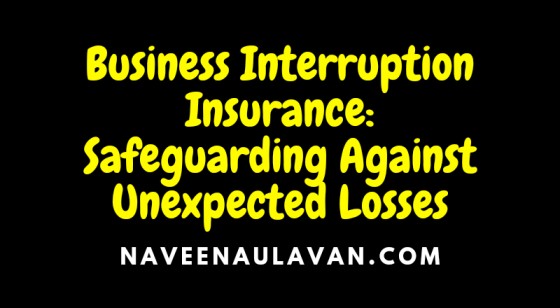Running a business involves numerous risks and uncertainties. From natural disasters to unexpected events like pandemics, businesses are susceptible to disruptions that can lead to significant financial losses. This is where business interruption insurance comes into play. Business interruption insurance is a vital coverage that helps businesses survive unexpected disruptions by providing financial support during the period of interruption. In this article, we will explore the concept of business interruption insurance, its importance, coverage options, and key considerations for businesses.
Understanding Business Interruption Insurance
Business interruption insurance, also known as business income insurance, is a type of coverage that compensates businesses for income losses and additional expenses incurred due to interruptions caused by covered events. It is designed to protect businesses from the financial impact of unforeseen disruptions that can disrupt their normal operations and revenue streams.
Importance of Business Interruption Insurance
Mitigating Income Losses
Business interruption insurance plays a crucial role in mitigating income losses when a business is unable to operate due to covered events such as fire, natural disasters, or civil unrest. It helps cover ongoing expenses such as payroll, rent, utilities, and loan payments, ensuring that the business can continue to meet its financial obligations during the interruption.
Coverage for Additional Expenses
In addition to income losses, business interruption insurance also covers additional expenses that businesses may incur to minimize the impact of the interruption. This can include costs related to temporary relocation, renting equipment, advertising to regain lost customers, and any other necessary measures taken to resume operations.
Protecting the Business’s Reputation
When a business is unable to fulfill its obligations or deliver products/services to customers due to an interruption, its reputation can suffer. Business interruption insurance helps businesses recover from such setbacks by providing financial support to maintain customer relationships and rebuild trust.
Coverage Options
Indemnity Period
The indemnity period is a crucial aspect of business interruption insurance. It determines the length of time for which the insurer will compensate the business for income losses. It is essential to carefully consider the appropriate indemnity period to ensure that it adequately covers the time required for the business to fully recover and resume normal operations.
Covered Perils
Business interruption insurance covers specific perils outlined in the policy. Common covered perils include fire, explosions, natural disasters (e.g., earthquakes, hurricanes), vandalism, riots, and civil unrest. It is important for businesses to carefully review the policy to understand which perils are covered and which are excluded.
Contingent Business Interruption Coverage
Contingent business interruption coverage extends the protection beyond direct interruptions to the insured business. It covers income losses caused by disruptions in the supply chain or the closure of key suppliers or customers’ businesses. This type of coverage is particularly relevant for businesses that heavily rely on specific suppliers or have a concentrated customer base.
Extended Business Interruption Coverage
Extended business interruption coverage provides additional protection by extending the indemnity period beyond the initial period defined in the policy. It accounts for the time required for the business to recover and regain its pre-interruption level of operations.
Key Considerations for Businesses
Thorough Risk Assessment
Before purchasing business interruption insurance, it is essential for businesses to conduct a comprehensive risk assessment. Identifying potential risks and evaluating their impact on business operations will help determine the appropriate coverage needed.
Accurate Business Valuation
To ensure adequate coverage, businesses must accurately assess the value of their assets, including property, inventory, and equipment. Underinsurance can result in inadequate compensation in the event of a claim, while overinsurance can lead to unnecessary expenses.
Careful Policy Review
Business interruption insurance policies can vary significantly in terms of coverage details and exclusions. It is crucial for businesses to carefully review the policy documents, paying attention to the coverage limits, waiting periods, deductibles, and any specific conditions or exclusions that may apply. Consulting with an insurance professional can help businesses understand the policy’s nuances and make informed decisions.
Business Continuity Planning
Business interruption insurance should be part of a comprehensive business continuity plan. Businesses should develop strategies to minimize the impact of disruptions, such as having backup systems, implementing emergency response protocols, and establishing alternative suppliers or distribution channels. By having robust contingency plans in place, businesses can reduce the duration and severity of interruptions.
Regular Policy Updates
As businesses evolve and grow, their insurance needs may change. It is important for businesses to regularly review and update their business interruption insurance coverage to ensure it aligns with their current operations, asset values, and risk profile. Failing to update the policy can leave businesses vulnerable to potential coverage gaps.
Seek Professional Guidance
Understanding the intricacies of business interruption insurance can be complex. Seeking guidance from insurance professionals who specialize in commercial insurance can help businesses navigate the process, choose the right coverage options, and ensure they have the necessary protection in place.
Conclusion
Business interruption insurance is a vital tool for safeguarding businesses against unexpected losses. It provides financial support to mitigate income losses and cover additional expenses during periods of interruption caused by covered events. By understanding the importance of business interruption insurance, exploring coverage options, and considering key factors, businesses can make informed decisions to protect their operations and ensure their long-term sustainability. Remember, every business is unique, so it is crucial to assess risks, evaluate coverage needs, and seek professional advice to tailor the insurance policy to specific circumstances. With the right coverage in place, businesses can confidently navigate disruptions and emerge stronger in the face of unexpected challenges.
